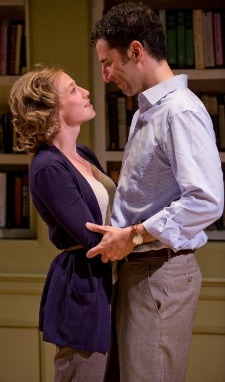Love, reality and other disquieting intrusions
Review: “The Real Thing” by Tom Stoppard, at Writers’ Theatre through Dec. 4. *****
By Lawrence B. Johnson
If love is blind, how does the heart know when it connects with Mr./Ms. Right? That’s the knotty question picked at in Tom Stoppard’s play ironically titled “The Real Thing.” And the closest this agonizing rumination comes to an answer is that true love may not be (with apologies to the Bard) an ever-fixed mark, but rather an ever-moving target.
Stoppard’s emotional rumble is smartly framed at Writers’ Theatre in a production that brings together a high-powered cast under the clear-eyed direction of Michel Halberstam, the company’s artistic director.
While “The Real Thing” is very much an ensemble vehicle, it has a specific center in Henry, a successful British playwright and witty master of the English language given to knee-jerk corrections of other people’s word usage and grammar. As geniuses tend to be, Henry is enthusiastically self-centered. Which is not to say he doesn’t love Annie, an actress who now shares his life. Time was, though, when he felt much the same way about Charlotte, also an actress.
Indeed, for these characters life has a way of imitating their passionate art. It’s a distinction that even the audience has trouble making with confidence as Stoppard keeps throwing us situational curve balls. Are we looking at real people in real situations or are they only play-acting? We’re never sure which is the real thing, a dilemma that puts us in the same boat with Henry, Annie and Charlotte.
It is Henry around whom “The Real Thing” turns. Henry is a certifiable intellectual, though he’s constantly stumbling over one tiny rift in his cultural landscape. He knows nothing about classical music. But he loves pop, especially the golden oldies. In one of the play’s funniest lines, Henry exclaims joyfully upon hearing Bach’s Air on the G String on the radio. Annie, surprised, asks if he means the Bach. Henry doesn’t know who that is, and dismisses the pretender as “a cheeky beggar,” declaring that it’s “practically a straight lift from Procul Harum, and he can’t even get it right.”
Sean Fortunato’s turn as Henry, biting and cock-sure but also sadly oblivious, provides a solid and magnetic core towards which all other dramatic elements are drawn. Fortunato wears Henry’s intellectual superiority, his complete and unquestioned command of language, like protective armor that perhaps shields him from emotional truth just it isolates him from the real world.
Annie, played with a persuasive mix of independence and vulnerability by Carrie Coon, loves Henry for the brilliance on display in every page he writes, in every incisive and often lacerating sentence he utters. But in time, she begins to feel distanced from Henry and drifts once more toward a new, more sympathetic version of reality. Taking up the cause of a young Scot imprisoned for desecrating a public monument in an anti-war protest, she resolves to star in a play the Scot has written – execrably, Henry points out – about his actions. Again, stage and life, role and reality get tossed into a tumble.
Coon is radiant as the woman so powerfully drawn to Henry’s dazzling flame, and as a real person in need of genuine care, true spiritual nourishment. Stoppard’s characters here are all quite real, in the very sense that their perceptions and choices imply life seen through a glass confusedly. Natasha Lowe’s Charlotte is self-sufficient, worldly and resilient enough not to get crushed by the marriage-go-round. And Rae Gray makes illuminating work of Henry’s free-spirited teenage daughter, who’s just as smart as Dad and proves to be the only person around who can meet him eye to dotted i.
As for real life, that may be the exclusive province of Annie’s angry young Scot, a lad called Brodie, whom we finally meet in the raw, plain-spoken person – um, pairson – of Ryan Hallahan. His may be an ugly reality, but it does help to beatify the world around him.
Related links:
- Location, dates and times: Details at TheatreinChicago.com
Photo caption and credit: Carrie Coon and Sean Fortunato play a couple looking for love in “The Real Thing.” (Michael Brosilow)


